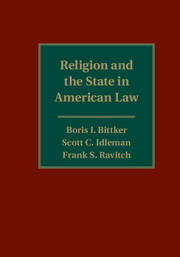Book contents
- Frontmatter
- Dedication
- Contents
- Preface
- 1 History and Introduction
- 2 Church and State in the Nineteenth Century
- 3 Religious Influences and Expressions in Law and Government
- 4 The Establishment Clause
- 5 The Free Exercise Clause
- 6 The Religious Test, Equal Protection, and Free Speech Clauses
- 7 The Definition of Religion
- 8 Church Property Disputes and Church Schisms
- 9 Contracts
- 10 Taxation
- 11 Employment
- 12 Land Use
- 13 Torts
- 14 Criminal Law and Process
- 15 Family Law
- 16 Public Education
- 17 Religious Symbolism on Government Property
- 18 Special Contexts: Prisons and the Military
- Appendix A Federal Constitutional Provisions
- Appendix B State Constitutional Provisions
- Appendix C Selected Federal Statutes 910
- Index
Appendix C - Selected Federal Statutes 910
Published online by Cambridge University Press: 05 October 2015
- Frontmatter
- Dedication
- Contents
- Preface
- 1 History and Introduction
- 2 Church and State in the Nineteenth Century
- 3 Religious Influences and Expressions in Law and Government
- 4 The Establishment Clause
- 5 The Free Exercise Clause
- 6 The Religious Test, Equal Protection, and Free Speech Clauses
- 7 The Definition of Religion
- 8 Church Property Disputes and Church Schisms
- 9 Contracts
- 10 Taxation
- 11 Employment
- 12 Land Use
- 13 Torts
- 14 Criminal Law and Process
- 15 Family Law
- 16 Public Education
- 17 Religious Symbolism on Government Property
- 18 Special Contexts: Prisons and the Military
- Appendix A Federal Constitutional Provisions
- Appendix B State Constitutional Provisions
- Appendix C Selected Federal Statutes 910
- Index
Summary
10 U.S.C. § 774. Religious apparel: wearing while in uniform
(a) General Rule. – Except as provided under subsection (b), a member of the armed forces may wear an item of religious apparel while wearing the uniform of the member's armed force.
(b) Exceptions. – The Secretary concerned may prohibit the wearing of an item of religious apparel –
(1) in circumstances with respect to which the Secretary determines that the wearing of the item would interfere with the performance of the member's military duties; or
(2) if the Secretary determines, under regulations under subsection (c), that the item of apparel is not neat and conservative.
(c) Regulations. – The Secretary concerned shall prescribe regulations concerning the wearing of religious apparel by members of the armed forces under the Secretary's jurisdiction while the members are wearing the uniform. Such regulations shall be consistent with subsections (a) and (b).
(d) Religious Apparel Defined. – In this section, the term ‘‘religious apparel’’ means apparel the wearing of which is part of the observance of the religious faith practiced by the member.
11 U.S.C. § 548 [Religious Liberty and Charitable Donation Protection Act of 1998, Pub. L. No. 105–183, 112 Stat. 517 (June 19, 1998) (codified at 11 U.S.C. §§ 544, 546, 548, 707, 1325)]
Section 548. Fraudulent transfers and obligations:
(a)(1) The trustee may avoid any transfer of an interest of the debtor in property, or any obligation incurred by the debtor, that was made or incurred on or within one year before the date of the filing of the petition, if the debtor voluntarily or involuntarily–
(A) made such transfer or incurred such obligation with actual intent to hinder, delay, or defraud any entity to which the debtor was or became, on or after the date that such transfer was made or such obligation was incurred, indebted; or
(B) (i) received less than a reasonably equivalent value in exchange for such transfer or obligation; and
(ii) (I) was insolvent on the date that such transfer was made or such obligation was incurred, or became insolvent as a result of such transfer or obligation;
- Type
- Chapter
- Information
- Religion and the State in American Law , pp. 910 - 936Publisher: Cambridge University PressPrint publication year: 2015



